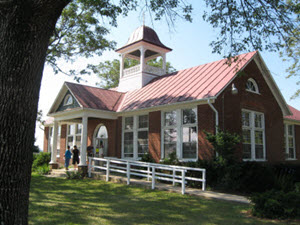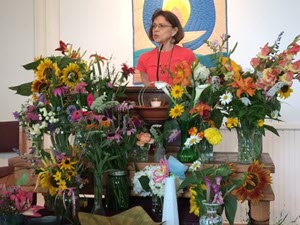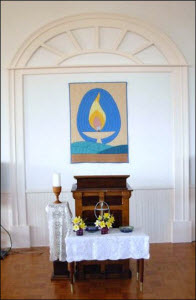
HUU Sermon Archives
Obedience to conscience: A war resister’s view
by Norman Lawson
October 19, 2003
Part of the presentation today will deal with an historical view of conscientious objection as well as my personal story as a CO.. The second part of the discussion will center on our present international conflict and how our religious principles might help clarify our view of the conflict.
Conscientious Objection is the term used to designate an individual’s objection to killing in time of war. Warfare between nations is explained to us as a means of making peace and controlling those humans who have killed or might possibly injure other human beings, particularly us. More especially the term, conscientious objector, designates individuals who, by reason of spiritual conviction and conscience find it impossible to join a group for the purpose of killing other individuals.
First let’s review a short history of conscientious objection in this country. From the beginning there were always some who refused to bear arms, mostly members of the churches who believed it was against the Bible to kill. These individuals were dealt with very harshly by those who read the Bible differently. Fining, confiscation of property and physical abuse were the common means of treating dissenters.
During WWI only members of the peace churches were granted noncombatant alternatives to military service. Those who opposed the war for political reasons or who were not of the recognized churches were forcibly inducted, court martialed and sentenced to military camps and prison. Of the 500 objectors who were court-martialed 17 received death sentences and 142 to life terms. I
When World War II commenced a conscription law was passed which stated that every young man was expected to fight. The exceptions to this rule were if one were physically or mentally handicapped, a full time college student, doing work of national importance or if one had a religious objection to killing other human beings. This last designation, referred to as Conscientious Objection ,was the lawful exception to any military service as extended to the historic Peace Churches, principally the Quakers, Mennonites and Brethren. It was easy to be considered a CO if one belonged to one of the afore mentioned churches . Before long there were other objectors outside the peace churches and they equally spoke of conscience. The peace churches and a few other groups propositioned the government, saying that they would handle the CO situation if they were left alone, more or less, to handle things themselves. Draft Boards would single out the serious objectors. These were sent to one of several dozen camps scattered throughout back-woods America where they would be out of sight. The government was happy to be relieved of the problem.
I, not being a member of a peace church, or any church for that matter, took my stand on the basis of my conscience. The question arises, quite naturally, just where did I get this notion of non- violent resistance? I didn’t get it verbally from my parents or from school. I’m sure my brother was a strong influence for he was also a war objector. The War Resister’s League answered many questions about registration as a CO but only after I approached them. The influences were many but I know for sure I would go to prison before I would shoot another human being. If I was capable of being trained to kill and then ordered to kill I was also capable of deciding not to kill.
Not fitting into any authorized category, the local draft board refused my application. So did the district board upon appeal , but a presidential petition finally gave me my CO status.
Civilian Public Service or CPS camps, actually old CCC camps, were set up by the peace churches in out of the way places around the country. In 1942 I was sent to a camp in northwest Pa. The work was forestry and related activities, the accommodations were cots in long barracks and the pay was five dollars a month even though we were supposed to get the pay of army privates.. The peace churches supplied food, clothing and supervision.
Six months later I was shipped to a Forest service directed government camp, in northern Michigan. The work was out doors in the Seney Wildlife Refuge. It was cold and snowy and the project was cutting firewood for a dozen oil drum stoves in the barracks. I was absolutely fascinated by the wild life- ducks, bald eagles, coyotes, beaver, mink, muskrats and more.
In late spring the camp was moved to northern California for the fire fighting season. Some of us fought forest fires, some built a bridge, some were pretty steady on the sick list. The camp director knew of my interest in the transcendentalist, Thoreau, and offered me several month’s duty in a lonely fire tower. I jumped at the opportunity to be by myself, study Thoreau and nature while I was spotting potential forest fires.
Some months later, one of our happy campers decided to hang a blanket around his 7x5 foot private compound with its bed, chair and misc. stuff. This quickly set the style and there were soon more than a dozen private units. The camp director, in consultation with Washington, ordered the partitions removed. Ten of us balked and argued the need. A date was set for compliance but the blankets were not taken down. Several days later we, the Terrible Ten, were hustled into the back of a truck and taken to the federal jail in Sacramento for refusal to obey orders.
We spent two weeks in jail waiting for our War Resister’s League’s lawyers in NYC to get bail money together. Out on bail, we were told not to leave the vicinity but four months later we were notified by the court that charges were dropped and we were free to go our way. So ended the saga of the Terrible Ten and my years as an official conscientious objector.
That’s the story of my war experience. That was 60 years ago. Is this any thing more than a distant memory to a tired old man? Obviously, I see a relationship to some present events. We are now in an undeclared conflict and there are world wide objections concerning the violent approach our country has taken to solving some of the injustices of the world. What does it mean to obey our conscience when it tells us that killing is not the way to solve the world’s problems?
Let’s take a look for a moment at our religious principles and consider how they might help us to do the right, if not the popular, thing in this situation. These Unitarian Universalist principles are listed on the back of the order of service given to you as you entered this building this morning.
I. The first principle speaks of the inherent worth and dignity of every person. This is a kind of meaningfulness and nobility in all people, friends, enemies- strangers- everyone.
II. Justice, equity and compassion for everyone and at all times.
III. Encouragement to spiritual growth in ourselves and others. This includes honesty and other deep seated qualifies.
IV. A free and responsible search for truth and meaning. Don’t be satisfied with the same old explanations for things.
V. The right of conscience- not just our own personal needs but the moral and spiritual needs of every one.
VI. Peace, liberty and justice for all.
VII. A respect for the related web of life. We are each an individual soul and also a part of one universal whole.
So what can we do about the world’s problems? What do we do with tyrants? How do we help people obtain a meaningful life? Feed their children, live in peace?
Philosophers have always said that we should start where we are. The evils we see in the world are reflections of our own selfishness, our own hostilities, our own desire to be number one regardless of how these attitudes impinge on others, near or far. The struggle to conquer one’s own lower nature is the true battle. If this is won, the solutions to the outer war become clearer.
From the dawn of history we’ve been struggling with a need to find solutions to the world’s problems. The Greek story of Ulysses and his many adventures while searching for a way home is the story of each of us trying to find and know ourselves. Arjuna in the Bhagavad Gita is faced with a similar conflict. Once he realizes that his real war is with his lower nature the outer battle is transformed into a desire to make his enemies his friends.
Religious leaders, east and west, tell us that peace can only come by being peaceful. Love can only come to us by loving, never by hating and certainly never by killing others. It seems that the only war worth fighting is the one within ourselves. Win the war within and the conflicts on the outside will be more easily and peacefully won; never the other way around.
In this world of instant satisfaction, the thought of spending a life time and perhaps life times struggling to know ourselves and control our lower feelings toward others seems an impossible task. But is there any other way? World peace can never come to people who have war in their hearts. There is no other way.
For the latest sermons and events at HUU, visit our Community Cafe.
Inclement
Weather Policy
Worship
Service Materials


UUs on YouTube
Our denomination has an official presence on YouTube! The Unitarian Universalist Association's YouTube site includes several videos and lots of interesting commentary.
Harrisonburg Unitarian Universalists 4101 Rawley Pike | Harrisonburg,
VA 22801
Mailing Address: | PO Box 96 | Harrisonburg, VA 22803
| (540) 867-0073 | Webmaster
HUU is a member of the Southern
Region of the Unitarian Universalist
Association
Privacy Policy &
Disclaimer
Site Design & Maintainence : Expression
Web Tutorials & Templates


